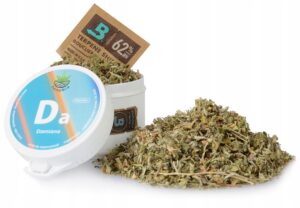Researchers at Cornell University are investigating the possibility of using hemp cannabinoids as ingredients in natural pesticides.
The results of earlier studies suggest that plants have begun biosynthesizing cannabinoids precisely to protect themselves from herbivores and insects that prey on them. With this knowledge, will it be possible to protect crops in an environmentally friendly way?
Cannabinoids protect the plant from pests?
As an evolutionary strategy, cannabinoid biosynthesis has almost certainly enhanced plant survival and growth. Had this not been the case, natural selection would likely have abandoned this complex and energetically costly mechanism for plants than maintained it for millions of generations.
The independent evolution of cannabinoids in several different plant lineages suggests important functionality. Although the adaptive value of cannabinoid production for plants is not definitively known, recognized theories include protection against herbivores, pathogens or ultraviolet radiation.
Cannabis C. sativa is believed to have evolved in high-altitude environments, which has led many researchers to postulate this latter function of cannabinoids. However, this theory cannot be said to have been scientifically proven.
Cannabinoids as protection against herbivores
Instead, there is evidence that cannabinoids provide the cannabis plant with protection from herbivores. Some scientists assume that the production of cannabinoids may have been the plant's adaptive response to the expansion of animals that threatened it.
The psychoactive THC would supposedly discourage herbivorous mammals from eating cannabis because of the effect it has on the nervous system (other mammals, like humans, have cannabinoid receptors that can be activated by the compounds in cannabis). This would be expected to result in reduced damage to plants or a change in herbivore preference.
Cannabinoids as protection against insects
Although insects do not have endocannabinoid systems and, thus, receptors with which plant cannabinoids could bind, it has been proven that these compounds can affect the insect body through other pathways.
Both individual Cannabis C. sativa plants and entire populations of these plants exhibit significant biochemical variation in cannabinoids. In other words: individual plants or groups of plants produce different concentrations of different cannabinoids.
Differences in cannabinoid concentration were observed to alter the consumption, growth and behavior of larvae of some insects on detached cannabis leaves. The larvae ate a smaller area of CBD-dominant leaves than cannabinoid-free leaves.
The presence of cannabinoids reduces leaf consumption, even if there are no other available food sources. The difference in cannabinoid concentration was the most significant variable (the difference in nutrients, etc., was minimized, for example). The effects were similar for the acidic forms of cannabinoids, including CBDA and THCA.
Hemp pesticides
Researchers at Cornell University (Ithaca, New York) indicate that cannabinoids derived from hemp may provide a new basis for natural pesticides. They cite previous research:
Pew researchers have shown that the Pieris brassicae butterfly can distinguish between leaves sprayed with THC and CBD, and that exposure to cannabinoids affects its egg-laying behavior.
In contrast, other researchers found that CBD had larvicidal activity against two varieties of beetle and one variety of mole.
It was also shown that they discovered that the larvae of a certain moth preferred to feed on leaves with lower levels of CBD, and that increasing concentrations of CBD reduced the size, weight and survival of the larvae.
For balance - fruit flies took a liking to leaves containing cannabinoids, and some colonies of ants paid no attention to the presence of THC in their food.
As a general rule, however, the tendency of many insect species to avoid hemp cannabinoids is so pronounced that research is being conducted into the possibility of using these compounds as ingredients in natural pesticides.
It is for this reason that research is underway at the agriculture department of the aforementioned Cornell University to develop new, environmentally neutral crop protection products with hemp cannabinoids as ingredients.








